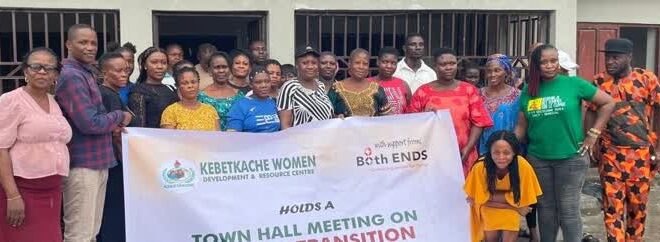As the advocacy for a transition to clean energy sources continue to generate debate and action across the world, non-governmental organisation, Kebetkache Women Development and Resource Centre, has restated the need for communities in the Niger Delta to immediately key into the new system so as to save the lives of the inhabitants of the region.
Addressing the media on the sidelines of a town hall meeting at Ibaka Town, in Okrika Local Government of Rivers State on Wednesday, April 2, 2025, Kebetkache’s Project Officer, Dr Confidence Otikor, highlighted the benefits of energy transition to include a cleaner environment, “which means improved air quality,” reduced pollution, job creation, socioeconomic benfits and enhanced energy security for the community.”
Dr Otikor, who spoke during the town hall meeting on ‘Energy Transition,’ urged the Ibaka community, and by extension other communities in the Niger Delta region, to embrace the global shift from fossil fuels to renewable energy sources, adding that renewable energy sources reduce carbon emissions and mitigate climate change. She stated that the proposed energy choice changes how energy is produced, distributed, and consumed.
The project officer said the call was in furtherance to Kebetkache’s approach to sustain awareness campaign for cleaner environment in the region. She observed that women play vital role in sustainable land management, conservation, and climate resilience which have a far-reaching positive impact on the environment and should be duly considered in the transition processes to ensure that their concerns are not left out.
She disclosed that Kebetkache’s intervention in the communities was supported by BothEnds, and meant to tackle the challenges of degradation of the ecosystem and gender inequality which are prevalent in the area.
Dr Otikor who facilitated the lecture said the Niger Delta “endures severe land degradation due to oil spills, continuous gas flaring, soil erosion, deforestation, and the extensive network of oil pipelinesin the region. The loss of mangrove forests and available land from coastal erosion has led to diminished agricultural productivity, threatening the sustainability of the environment”.
Hence, the advocacy for a Just Energy Transition is crucial and has been on the need to consider everybody, while planning the strategy or a transition. Meanwhile, shifting from fossil fuels to renewable energy sources in a way that is equitable and inclusive is best practices.
Other Kebetkache staff present at the town hall meeting were program officers, Mrs Mary Alexander, Mrs Idongesit Smart and Mr Chukwuemeka Uneanyi. Speaking separately, they emphasized the need to switch to better energy sources, as well as the inclusion of women to ensure that the energy transition is gender responsive and sustainable.
Some of the highlights of the programme was the planting of over 200 mangroves at the waterfront at Ibaka community, as a conservative measure to cushion the effect of oil pollution, degradation and the high rate of deforestation within the coastal region of the community.
Our correspondent said this seeks to restore the ecosystem to a better health and ensure livelihood for the people.
 PH Mundial – Port Harcourt Online Newspaper News Across The Region
PH Mundial – Port Harcourt Online Newspaper News Across The Region





